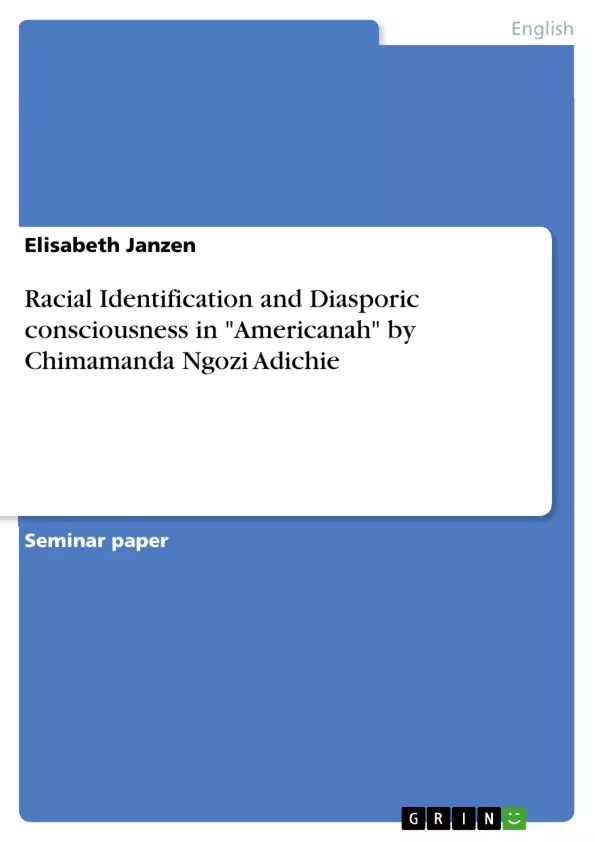“Americanah” by Chimamanda Ngozi Adichie is a representative Afropolitan migration novel that depicts the still prevalent institutional and everyday racism underlying and deeply embedded in American society. In the following, I will therefore assess to what extent racism and discrimination affect the character Ifemelu and the process of her Afropolitan identity formation after migrating to the US and back to Nigeria again.
The crucial underlying question is whether the US could live up to its own ideals as they always preached equality and freedom for every American citizen or whether they fail to set an international example for equality for all.
Inhaltsverzeichnis (Table of Contents)
- Introduction
- Postcolonialism and Diaspora
- Definition
- Relevance in the novel
- Ifemelu's journey of becoming – formation and identity building with regard to race and culture
- Hair
- Language/blog
- Interpersonal relationships and sexual identity
- Cultural hybridity/ Diasporic consciousness
- Conclusion
- Bibliography
Zielsetzung und Themenschwerpunkte (Objectives and Key Themes)
This term paper aims to analyze the portrayal of racial identification and diasporic consciousness in Chimamanda Ngozi Adichie's novel "Americanah," focusing on the experiences of the protagonist Ifemelu. The paper explores how the novel engages with the themes of postcolonialism, racism, discrimination, and identity formation within a globalized context.
- The impact of racism and discrimination on the identity formation of Black people in the Diaspora
- The challenges and opportunities of navigating different cultural contexts and identities
- The role of postcolonialism in shaping contemporary social and cultural landscapes
- The evolving dynamics of race and gender within a globalized world
- The complex relationship between individual experiences and broader social structures
Zusammenfassung der Kapitel (Chapter Summaries)
The introductory chapter explores the contemporary relevance of racism and discrimination, highlighting the Black Lives Matter movement and the ongoing struggle for racial justice. It sets the context for the analysis of "Americanah" by emphasizing the importance of understanding the historical and political context in which the novel is situated.
Chapter 2 delves into the theoretical concepts of postcolonialism and diaspora, providing a framework for examining the novel's engagement with these themes. It defines key terms and discusses the significance of postcolonial studies for understanding the experiences of people from formerly colonized countries.
Chapter 3 focuses on Ifemelu's journey of becoming, analyzing how her experiences in the United States shape her understanding of race, culture, and identity. The chapter explores various aspects of her personal development, including her experiences with hair, language, interpersonal relationships, and cultural hybridity.
Schlüsselwörter (Keywords)
Key terms and concepts explored in this term paper include postcolonialism, diaspora, racism, discrimination, identity formation, Afropolitanism, migration, globalization, and the Black Lives Matter movement. The paper examines the intersection of race, gender, and culture in shaping individual and collective experiences within a globalized context.
- Quote paper
- Elisabeth Janzen (Author), 2021, Racial Identification and Diasporic consciousness in "Americanah" by Chimamanda Ngozi Adichie, Munich, GRIN Verlag, https://www.grin.com/document/1234606



